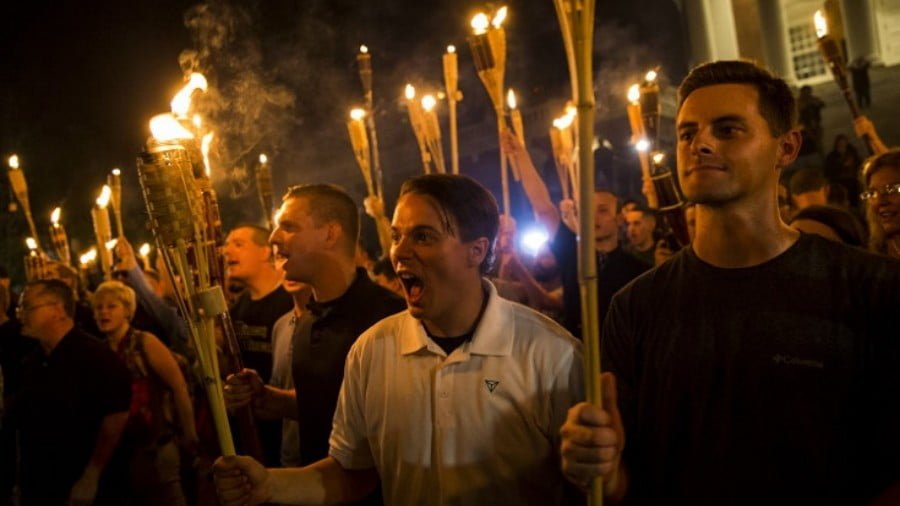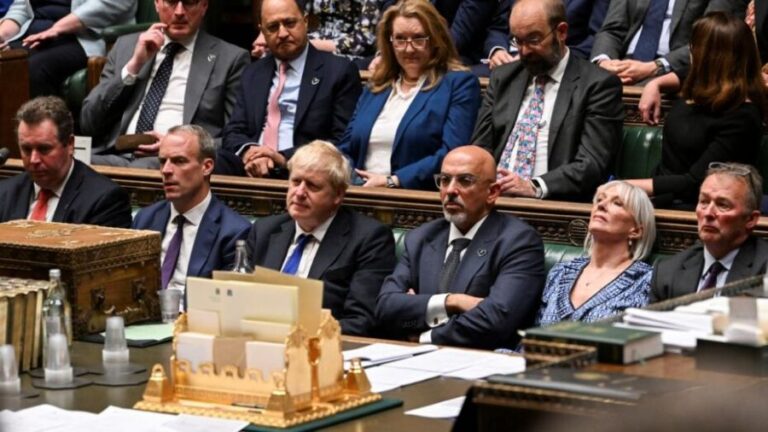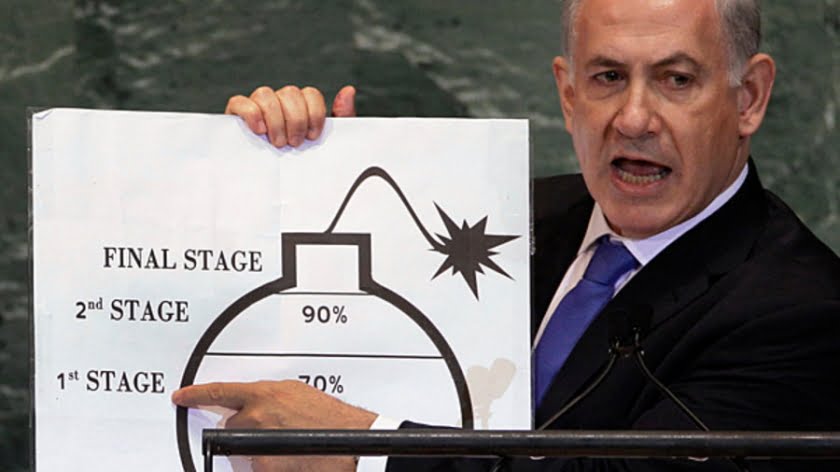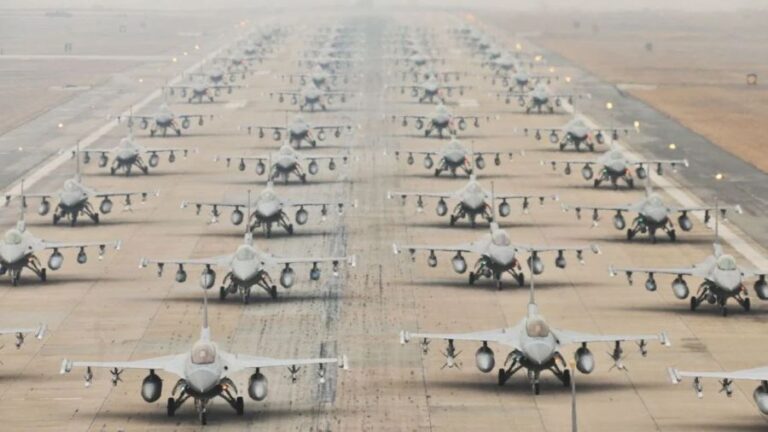The Russian Interference Report, Without Laughing
Now the madding crowd has moved on, I take a mature look at the report by the Intelligence and Security Committee on Russia. It is so flawed it is tempting simply to mock it. But in fact, it is extremely dangerous.
It calls expressly and repeatedly for the security services to be actively involved in “policing the democratic space” and castigates the security services for their unwillingness to interfere in democratic process. It calls for tough government action against social media companies who refuse to censor and remove from the internet material it believes to be inspired by foreign states. It specifically accepts the Integrity Initiative’s Christopher Donnelly and Ben Nimmo as examples of good identifiers of the material which should be banned – even though Nimmo is the man who stated that use of the phrase “Cui bono” is indicative of a Russian troll, and who accused scores of ordinary Scottish Independence supporters of being Russian trolls.
In order for you to assess the threat of a report which specifically calls on the social media companies to ban those individuals the British government identifies as Russian trolls, and which calls on the security services to act against those people, remember Ian.
Ian was identified by the British government as a Russian troll, on the word of Nimmo and Donnelly – exactly the “experts” on which this report relies. This report proposes Ian, and people like him, be banned from social media and subject to security service surveillance.
Listen to Ian:
In short the report is a real threat to democracy. Its evidence base is appalling, and that is what I shall look at first.
The ISC took evidence from just five “experts” outside the intelligence services. They were Anne Applebaum, Bill Browder, Christopher Donnelly, Edward Lucas and Christopher Steele. I do not quite know how to get over to you the full significance of this. It would be impossible to assemble a group of five witnesses with any pretence whatsoever to respectability (and some of them have an extremely tenuous link to respectability) that would be more far out, right wing and Russophobic. They are the extreme fringe of anti-Russian thinking. They are nowhere near the consensus among the academic, diplomatic and other genuinely expert communities on Russia.
There is simply no attempt at balance whatsoever. The best I can try to get over the extent of this would be to compare it to a hypothetical parliamentary inquiry into Old Firm rivalry where the only witnesses are Scott Brown, Neil Lennon, John Hartson, the Green Brigade, and a Cardinal. There is not any attempt from the ISC to interview any witness who is even remotely balanced or can give the view from the other side. Some might feel that a report entitled simply “Russia” which called zero actual Russians as witnesses is somewhat flawed.
To go through those witnesses.
Anne Applebaum is the most respectable of them. I should state that I know both Anne (whom I know as Ania) and her husband, Radek Sikorski MEP, slightly from my time as First Secretary at the British Embassy in Poland (1994-8). Anne is a right wing journalist who has worked at both the Spectator and the American Enterprise Institute, a Randian think tank. She identifies as Polish and shares the understandable visceral distrust of Russia felt by the Polish right. Her husband Radek Sikorski is a long term friend of Boris Johnson, member of the Bullingdon Club, also worked at the American Enterprise Institute and is a former Defence Minister of Poland. Radek’s persona as a politician is very much based around his hawkish stance on Russia. Both Anne and Radek have consistently argued for the aggressive eastward expansion of NATO and forward stationing of US troops and missiles towards Russia.
Bill Browder is a billionaire who made his money out of the Russian people from the fallout of Russia’s chaotic privatisation process. He achieved fame by portraying his highly corrupt accountant, Sergei Magnitskiy, as a human rights campaigner murdered by the Russian authorities. Browder’s account of events was found to be fundamentally false by the European Court of Human Rights, in a judgement which received zero truthful reporting in Western media. Here is an extract from the judgement of the ECHR:
The applicants argued that Mr Magnitskiy’s arrest had not been based on a reasonable suspicion of a
crime and that the authorities had lacked impartiality as they had actually wanted to force him to
retract his allegations of corruption by State officials. The Government argued that there had been
ample evidence of tax evasion and that Mr Magnitskiy had been a flight risk.
The Court reiterated the general principles on arbitrary detention, which could arise if the
authorities had complied with the letter of the law but had acted with bad faith or deception. It
found no such elements in this case: the enquiry into alleged tax evasion which had led to
Mr Magnitskiy’s arrest had begun long before he had complained of fraud by officials. The decision
to arrest him had only been made after investigators had learned that he had previously applied for
a UK visa, had booked tickets to Kyiv, and had not been residing at his registered address.
Furthermore, the evidence against him, including witness testimony, had been enough to satisfy an
objective observer that he might have committed the offence in question. The list of reasons given
by the domestic court to justify his subsequent detention had been specific and sufficiently detailed.
The Court thus rejected the applicants’ complaint about Mr Magnitskiy’s arrest and subsequent
detention as being manifestly ill-founded.
The ECJ found that Magnitskiy indeed died as a result of the shortcomings of Russia’s brutal prison regime – very similar to that of the United States in this regard – but that he was properly in prison on viable criminal charges. The western media may ignore the fact that Browder’s activism is motivated entirely by a desire to hold on to his own vast ill-gotten wealth, and that the highest of courts has found his campaigning is based on a false narrative, but it is deeply, deeply shocking that the members of the Intelligence and Security Committee, who must know the truth, still give Browder credibility. There is no sense in which Browder is a respectable witness.
Christopher Donnelly was forced to step down as a person with significant control of fake charity “The Institute for Statecraft” after the Scottish Charity Regulator found that:
“There was no clear explanation as to why the salaries being paid to charity trustees were considered reasonable and necessary, and we had concern about the charity trustees’ decision-making process around these payments. We do not consider that this private benefit was incidental to the organisation’s activities that advanced its purposes”.
In other words, making money for its trustees, principally Christopher Donnelly, was a purpose of the Institute for Statecraft, not an incidental benefit. This is what the Charity Regulator also found about this fake charity:
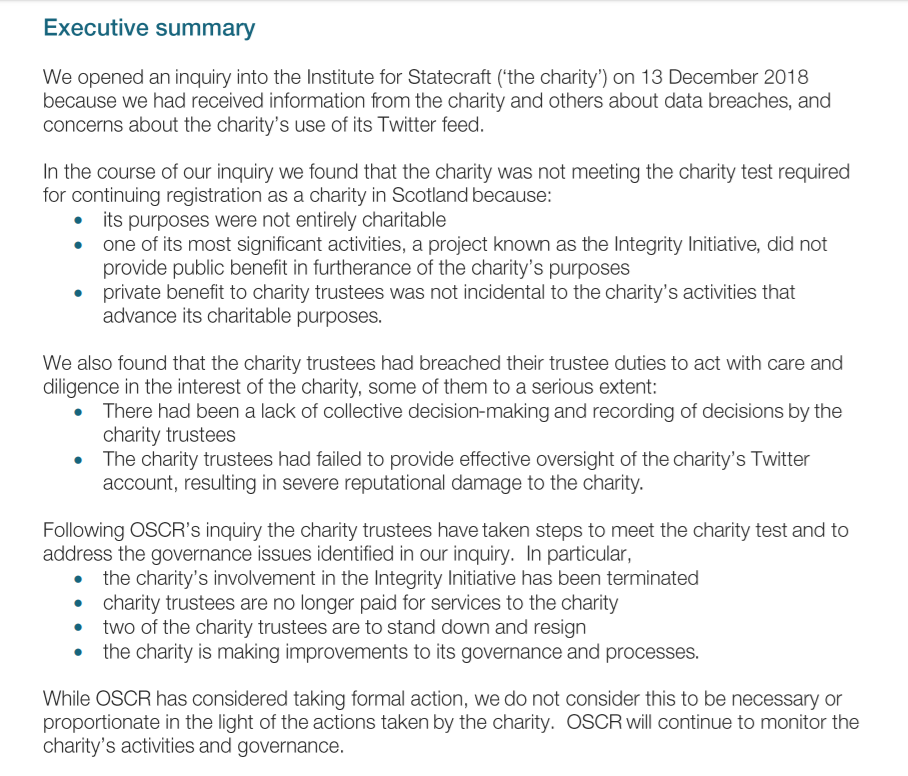
The Charity Regulator also found that the Integrity Initiative, run by the Institute for Statecraft, was sending out party political tweets. All of this activity was of course carried out with taxpayers money, the Integrity Initiative being funded by the FCO, the MOD, and the security services.
The Integrity Initiative is a covert propaganda organisation designed to do precisely what the ISC report accuses Russia of doing – covertly influencing politics in both the UK and numerous other countries by state sponsored propaganda disguised as independent journalism or social media posts. Christopher Donnelly heads the Integrity Initiative. Its basic method of operation is secretly to pay mainstream media journalists around the world to pump out disguised British government propaganda, and to run hidden social media campaigns doing the same thing.
All of the “expert witnesses” before the committee feature in the leaked Integrity Initiative documents as part of Integrity Initiative activites. They are all engaged in doing precisely what they here accuse the Russians of doing. The best exposition, to the highest academic standards, of the fascinating leaked documents of the Integrity Initiative operation is by the Working Group on Syria, Propaganda and the Media. You can very happily spend an hour looking through their report.
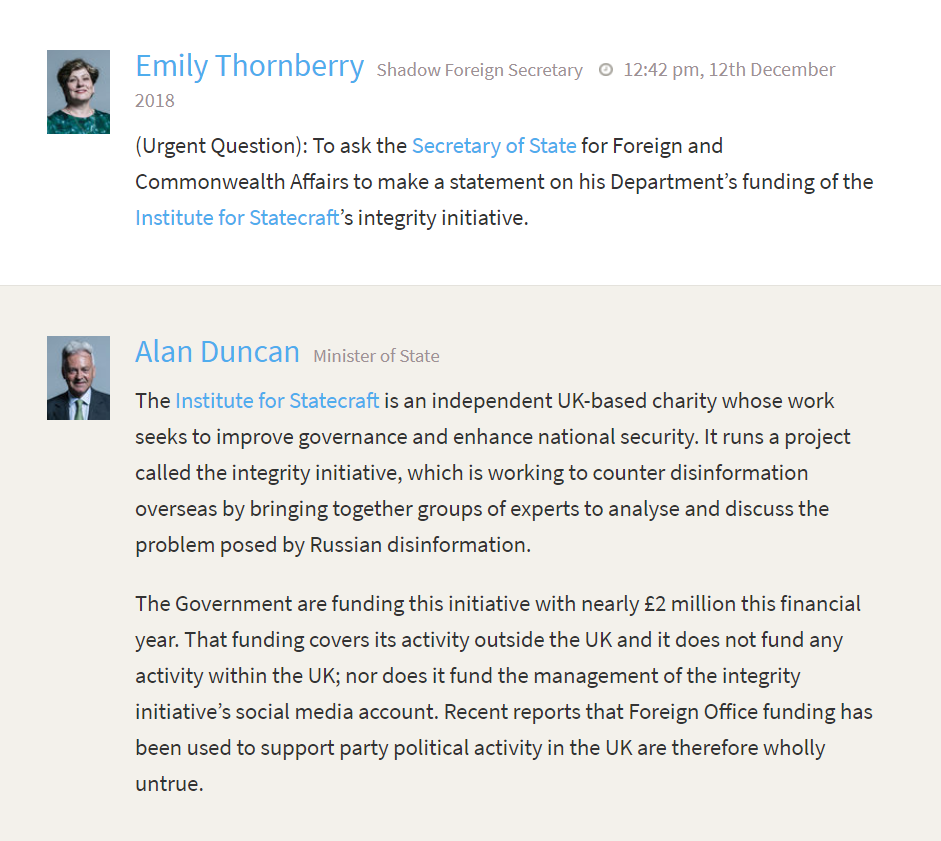
So the UK was asking its own paid propagandists what they thought of the Russian propagandists. Every one of the witnesses makes their living from postulating the Russian threat. They therefore said the Russian threat is very big indeed.
Edward Lucas is a hilarious professional Russophobe. He is the go-to anti-Russia expert of the BBC, and can be guaranteed to say something stimulating, such as this:

Lucas actually uses #newcoldwar in his twitter profile, and is jolly keen on the idea.
Christopher Steele is a charlatan and con-man. He is by no means unique in trading on the glamour and reputation of MI6 to build up a consultancy business after an undistinguished career as a middle ranking MI6 officer.
When Steele produced, for a large sum of money, his famous “Pee dossier” on Donald Trump’s “collusion” with Russia, it was obvious to anyone with any professional background in intelligence analysis that it simply could not be genuine. It claimed to have a level of access into Russian security circles which is greater than the penetration ever secured by MI6 or the CIA. I immediately pointed out its deficiencies, but these were ignored by an establishment media desperate to explain away the Trump insurgency into their political space.
Since then the dossier has simply fallen apart. Steele has been successfully sued by people named in the dossier. The lawyer Michael Cohen has shown that he was definitively not in Prague on the date Steele claimed he was meeting Russian hackers there, and indeed has never been to Prague. Most telling of all, it turns out that most of the content of the dossier was simply a compilation of the gossip of the Russian emigre community in Washington by Igor Danchenko, formerly a junior staff member at the Brookings Institute, a liberal foreign policy thinktank.
The silence of the media on the unravelling of the Steele Dossier has been so remarkable it has drawn comment in unexpected quarters:
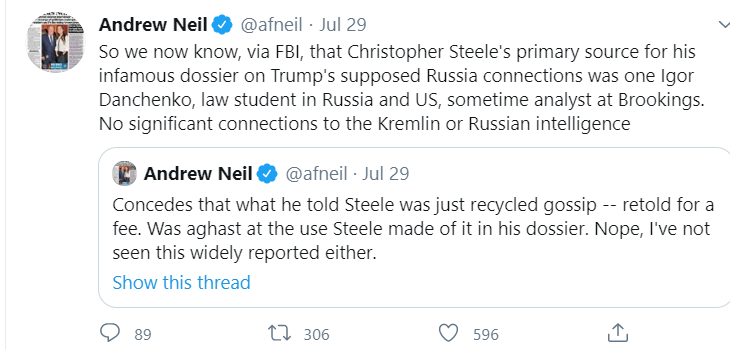
Having seen the quality of the input, it is unsurprising that the report is a case of “rubbish in, rubbish out”. So let us now, with rubber gloves and a peg on the nose, pick through the rubbish.
To start at para 1, the tone is immediately set of paranoid antagonism to Russia. There is no attempt at balance whatsoever; anti-Russian statement is built on anti-Russian statement until we are supposed to be carried away by the stream of rhetoric to accept each succeeding proposition as it is piled up. Like this one:
The murder of Alexander Litvinenko in 2006 demonstrated that Russia under President Putin had moved from potential partner to established threat.
Did it really? Accepting for the sake of argument that the official British explanation of Litvinenko’s death is true and it was a murder by the Russian state, does that show that Russia is an “established threat”? It would certainly be an appalling abuse of human rights and show Russia is a threat to Russian dissidents, but would it really show Russia is an “established threat” to you and me? Plenty of other countries murder their opponents abroad, notably the USA, Saudi Arabia, Israel and Uzbekistan, countries the UK government is proud to call allies. The UK kills opponents abroad continually, in drone strikes, including deliberately by drone killing its own citizens and even killing young British children. I can condemn all such murders equally. But why should we be carried away by the anti-Russian rhetoric into finding it uniquely reprehensible, only when Russia does it?
I could go through every single para of the report, but life is too short. I will however pick out places where the logic is far less convincing than the rhetoric is impressive. From Para 3:
its lack of strong independent public bodies and the fusion of government and business allow it to leverage all its intelligence, military and economic power at the same time to pose an all-encompassing security threat.
Really? Is Russia really that unified? In fact, this is a startling over-simplification. The extreme oligarchic structure which resulted from the wholesale looting of assets in the western-inspired and western-overseen chaos of Russian privatisation has resulted in a state which is indeed not a healthy democracy. But neither is it a monolith with no dissent and no conflicting interests, and Putin has continually to balance the desires and goals of different oligarchs and factions. Not many Russians would recognise the portrayal here of a super efficient and coherent state and business machine.
Besides, even if it were true, Russia would still only have one fifth of the population of the European Union and an economy the size of Spain. The attempt to pump up Russia as a massive threatening superpower is simply nonsense. What Russia does have is the ability to take decisive politico-military action, on a small scale in limited theatres, such as Crimea or Syria. It does so with success because it has a leader who is better at the game of international realpolitik that his western contemporaries. That is not a value judgement: I personally believe Putin is right in Syria and wrong in Crimea. But to blame Russia for the decrepit state of current western diplomacy is a stretch.
By para 4 the report is surfing along on a surreal wave of nonsense:
The security threat posed by Russia is difficult for the West to manage as, in our view and that of many others, it appears fundamentally nihilistic.
Really? Nihilistic? Now the report has already stated that Russia is a remarkably monolithic and unified state apparatus, controlled presumably by President Putin. I can think of many adjectives to describe Putin, some of them not very pleasant – calculating, machiavellian and devious would be amongst them. But he is the absolute opposite of nihilist. He has a clearly defined view of Russia’s interests – and that view identifies Russian interests far too closely with himself and other oligarchs – and sets out diligently and consistently to advance those interests.
So you can define clear Russian policy goals in the international sphere. These include the consolidation of Russian influence in the former Soviet Union and, where possible, the re-integration of contiguous Russian majority speaking territory into Russia, as seen in Georgia and Ukraine. They include the reduction of democratic space for political dissent at home. They include the countering of American influence abroad, particularly in the Middle East and Central Asia. These are serious, hard-headed policies. The very last word I would use to describe them is nihilistic. The Russian oligarch class are as unquestioningly materialist as any class in any society, ever. They are not nihilists.
I can only imagine that the committee picked up on the word “nihilist” from one of the crazed flights of fancy of Edward Lucas.
Para 4 then blunders on into still stranger territory:
It is also seemingly fed by paranoia, believing that Western institutions such as NATO and the EU have a far more aggressive posture towards it than they do in reality.
What could give them that idea?
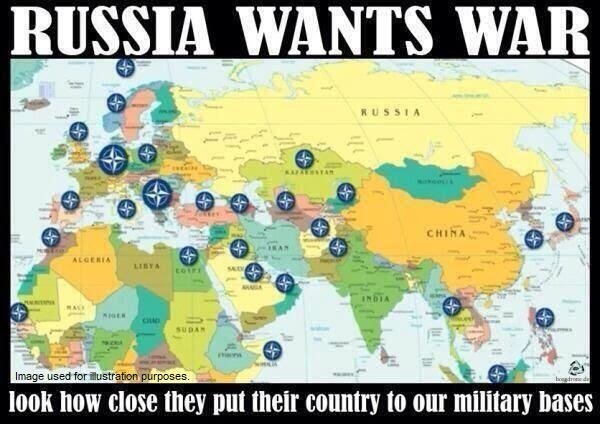
But what is really strange is the lack of self awareness; a report built entirely upon paranoia about the Russian threat accuses Russia of paranoia about the western threat.
The next few paragraphs make repeated reference to the “Salisbury attacks” and simply take for granted the narrative that Russia was responsible for these. This I am not prepared to do. Clearly some kind of spy subterfuge took place in Salisbury involving both the UK and Russia, but there are too many obvious lies in the official UK government account. I still have seen no answers to my ten outstanding questions, while the attribution of the poison gets ever shakier, with new revelations from that cesspool of corruption, the bureaucracy of the OPCW.
Paras 13 to 20, on cyber warfare, again show that complete lack of self-awareness. They attribute a number of cyber hacks to Russia and the GRU, as though we did not know from Wikileaks Vault 7 leaks that the CIA specifically has a programme, “Umbrage” for leaving behind fake evidence of a Russian hack. But more tellingly, they quote GCHQ as their source of information.
Now it is a simple truth that hacking Russian communications, including military, political, security, research and commercial communications, has been a core part of GCHQ tasking from its establishment. Assuming at least some of the attributions to Russia on cyber warfare are correct, the synthetic outrage at Russia doing what we have been doing to Russia on a far, far larger scale for decades, is laughable. Even more so when paras 20 to 24 talk of the need for the MOD and GCHQ to expand their offensive cyber warfare as though this were a retaliatory measure.
From para 27 onwards the committee is talking about broadcast and new media disinformation campaigns. Here it stops pretending it knows any secret intelligence and states its information is open source, as at footnote 24 where the sources are frothing mad Edward Lucas and fake charity purveyor Christopher Donnelly, telling us how terrible Russian troll campaigns are.
Yet again, there is a total lack of self awareness. The committee fails to note that Donnelly himself has been spending millions of UK taxpayers’ money (at least that which did not go into his own pocket) running absolutely, precisely the same kind of covert campaign of hidden influence propaganda that they are accusing Russia of running. They accuse Russia Today of bias as though the BBC did not have its own state propaganda bias. Yet again, the lack of self-awareness is stunning.
Now we start to reach the stage where all this sanctimonious hypocrisy become really dangerous. Before you read this next few paras of the report, I would remind you that the repression of every bad regime everywhere has always been, in the eyes of the repressive security service, defensive. It is always to protect the truth, to prevent the spread of the lies and disaffection of evil foreign influence. That was the justification of the Cheka, the Gestapo, the Stasi and every South American dictator. They were all protecting the people from foreign lies. Now read this from the committee, and consider what it really means:
33. Whilst we understand the nervousness around any suggestion that the intelligence
and security Agencies might be involved in democratic processes – certainly a fear that is
writ large in other countries – that cannot apply when it comes to the protection of those
processes. And without seeking in any way to imply that DCMS is not capable, or that the
Electoral Commission is not a staunch defender of democracy, it is a question of scale and
access. DCMS is a small Whitehall policy department and the Electoral Commission is an
arm’s length body; neither is in the central position required to tackle a major hostile state
threat to our democracy. Protecting our democratic discourse and processes from hostile
foreign interference is a central responsibility of Government, and should be a ministerial
priority.
34. In our opinion, the operational role must sit primarily with MI5, in line with its
statutory responsibility for “the protection of national security and, in particular, its
protection against threats from espionage, terrorism and sabotage, from the activities of
agents of foreign powers and from actions intended to overthrow or undermine
parliamentary democracy … ”.38 The policy role should sit with the Office for Security and
Counter-Terrorism (OSCT) – primarily due to its ten years of experience in countering the
terrorist threat and its position working closely with MI5 within the central Government
machinery. This would also have the advantage that the relationship built with social media
companies to encourage them to co-operate in dealing with terrorist use of social media
could be brought to bear against the hostile state threat; indeed, it is not clear to us why the
Government is not already doing this.
35. With that said, we note that – as with so many other issues currently – it is the social
media companies which hold the key and yet are failing to play their part. The Government must
now seek to establish a protocol with the social media companies to ensure that they take
covert hostile state use of their platforms seriously, and have clear timescales within which
they commit to removing such material. Government should ‘name and shame’ those which fail to
act. Such a protocol could, usefully, be expanded to encompass the other areas in which action
is required from the social media companies, since this issue is not unique to Hostile State
Activity. This matter is, in our view, urgent and we expect the Government to report on progress
in this area as soon as possible.
The government endorsed Donnelly/Nimmo operation identified Ian above as a Russian agent. I have no doubt they would count this article as Russian disinformation. They would set MI5 on Ian and I, and ensure our posts would be banned from social media. Only such a corrupt mainstream media as we have in the UK would fail entirely to note – and they have failed entirely to note – the extreme and illiberal aspects of this report.
There is a real danger identified by the report. But it is not Russia, it is the McCarthyite witch-hunt the report seeks to promote, ironically based upon an entire sea of disinformation.
By paragraph 42 the committee has left reality entirely behind in favour of a tour of Clintonland.
42. It was only when Russia completed a ‘hack and leak’ operation against the
Democratic National Committee in the US – with the stolen emails being made public a
month after the EU referendum – that it appears that the Government belatedly realised the
level of threat which Russia could pose in this area, given that the risk thresholds in the
Kremlin had clearly shifted, describing the US ‘hack and leak’ as a “game changer”,46 and
admitting that “prior to what we saw in the States, [Russian interference] wasn’t generally
understood as a big threat to [electoral] processes”.
Contrary to the committee’s bland assertion, it is now well established that there never was any Russian hack of the DNC. Mueller failed entirely, after spending US $32million, to establish either a hack or Russian “collusion” with the Trump campaign. The only “evidence” there ever was for the Russian hack was an affirmation by the DNC’s security consultants, Crowdstrike, and this summer we learnt that Crowdstrike had never had any evidence of a Russian hack either. While those of us close to Wikileaks have been explaining for years it was a leak, not a hack. We were ignored by the media as it did not fit with the official disinformation campaign.
The committee query why the UK security services were not alerted by the DNC hack to take additional measures against Russia. The answer to that is very simple. The UK and US security services share all intelligence, so the UK security services were well aware from the US intelligence information that there was in fact no Russian hack. Unlike their US counterparts, they were not led by Clinton appointed loyalists prepared to perpetuate and act upon the lie to try to serve their political masters. On the other hand, the UK security services evidently did not feel it necessary to dampen the ardour of the committee on this point when it was about to propose a large increase in their powers and their budgets.
I had already blogged on paragraph 41 of the report and its accusation of Russian interference in the election campaign, founded entirely on a published article on Medium by witch-finder general, the Livingston unionist Ben Nimmo. That article states, among other things, that many Independence supporters on social media also support Russia on Ukraine, and therefore must be agents of Russian influence – as opposed to Scots who happen to support Russia over Ukraine. It notes that a number of people who support Scottish Independence appear not to have English as their first language, and some have trouble with definite and indefinite articles; therefore, Nimmo concludes they must be Russian trolls. As though we have no migrants who support Scottish Independence – and ignoring the fact Polish, Lithuanian, indeed the majority of languages in the world, also do not use definite and indefinite articles.
Let us remind ourselves of Ben Nimmo’s brilliant identification of top Russian trolls, nine out of ten of which turned out to be ordinary Scottish Independence supporters who simply tweeted things Nimmo does not like, while the tenth is a news aggregation bot which actually has the word “bot” in its name. That the committee takes this stuff seriously is a fact so eloquent in itself, I need hardly say more.
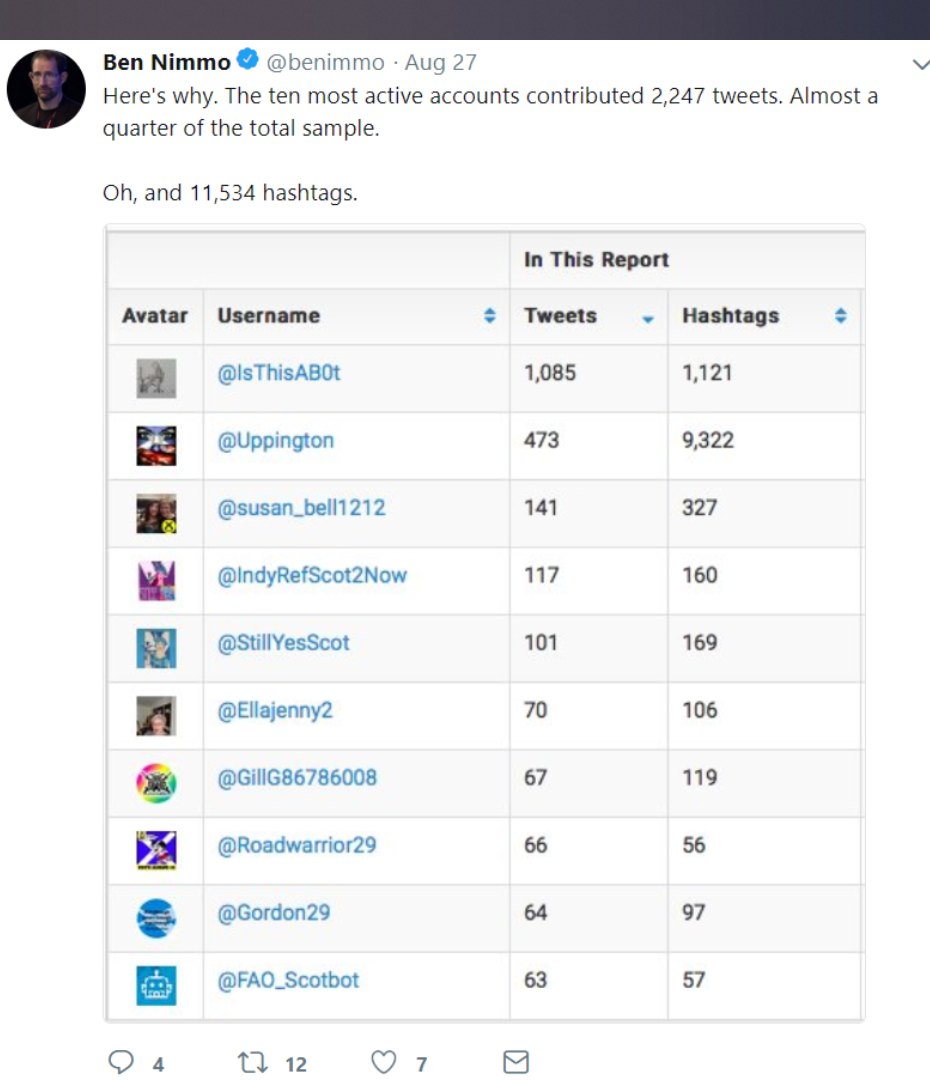
When we arrive at section 49 we finally reach material with which I can wholeheartedly agree. The UK, and the City of London in particular, was absolutely wrong to have welcomed in with open arms the Russian billionaires whose fortunes had been looted from the Russian people in the chaotic privatisation process, where assets were seized often by brute force, sometimes by bribery. There is no decent society in which the Deripaskas, the Usmanovs, the Lebvedevs, the Abramovics, should be accorded respect. Dirty money corrupts financial and political institutions. The committee is absolutely correct about that.
But have these people been living under a rock? UK politics and society have been a stinking morass of corruption for generations. Saudi money has worked in exactly the same way as Russian, and has had a bigger political influence, leading to a quite disgusting blind eye being turned to appalling human rights violations and military aggression against civilians. The same is true of all the Gulf states. London has been awash for over 40 years with Nigerian plutocrats, every single one of whose wealth has been corruptly looted. When I worked at the British High Commission in Lagos, the snobs’ estate agent Knight Frank and Rutley had an office there, staffed by expatriates, which did nothing but sell Surrey mansions and Docklands penthouses to crooks.
Malaysia, Brunei, the Philippines, Angola, Sierra Leone, there is not a blood diamond or corruptly acquired oil barrel whose proceeds do not wash up in London. Four of the world’s top ten tax evasion bases are British colonies. The committee was right to describe the City of London as a “laundromat” for looted money, but wrong to ascribe that mainly to Russia. That is without considering the disgusting activities of our own UK and US billionaires, who control our media and ultimately our politics.
I can join in the committee’s condemnation of Russian oligarchs influence in British society, and especially their influence as donors on the Tory party. But remember Mandelson/Deripaska. The corruption has no ideological basis except selfishness. The financial interests of British, American, Russian, Saudi, French, Malaysian or any other billionaires are entirely intertwined, as is their political influence. It is the billionaires against the people. The nationality of the particular billionaire is irrelevant. I strongly recommend this report by Transparency International on the massive involvement of “respectable” British institutions in facilitating obviously corrupt transactions.
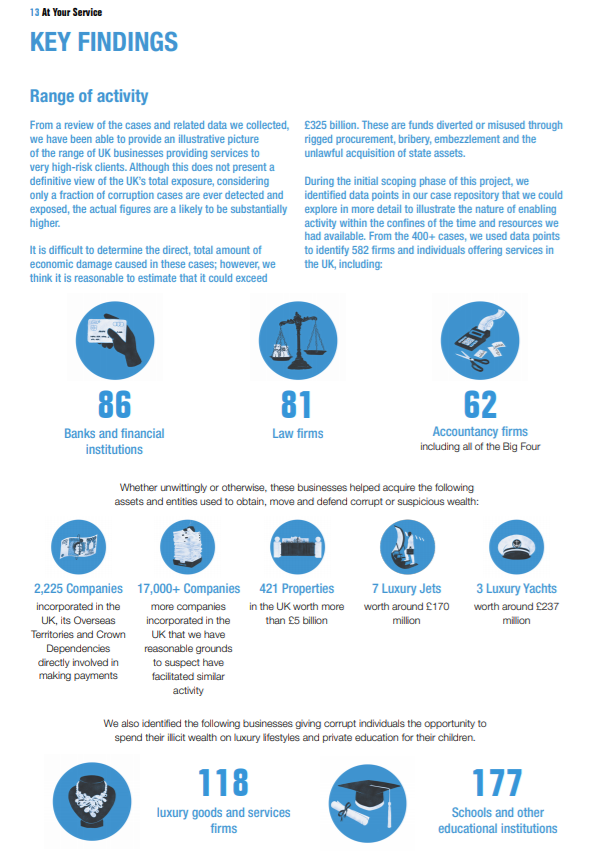
Does anybody seriously believe the influence of Russian billionaires is somehow more pernicious in the UK than the Saudis or any of the others I have mentioned? Of course nobody believes that; this report only achieves its aim by a blinkered focus on a singular anti-Russian racism. I am not going to expound on any more of the report, because there is a limit to how much racism I am prepared to wade through.
But before closing, I want to consider how enthusiasm for the new Cold War has swept up pretty well the entire political and media class. There are of course those who were enthusiasts for the last Cold War, the military and security services, the arms industry and bottom feeders like Christopher Steele and Christopher Donnelly, who make a surprisingly fat living from peddling the disinformation the state wishes to hear.
But the “Russia is the enemy” narrative has been taken up not just by the traditional right, but by those who would probably self-describe as liberal or social democrat, by supporters of Blair and Hillary.
Most of the explanation for this lies in the success of Blair and Clinton in diverting the “left” into the neo-con foreign policy agenda, through the doctrine of “liberal intervention”, which was the excuse for much Victorian imperialism. The notion is that if you only bomb and maim people in developing countries enough, they will develop democratic forms of government.
This thesis is at best unproven. But once you persuade people to accept one form of war, they seem to become enthusiasts for more of it, particularly those who work in media. It remains the most important single fact in British politics that, despite the fact almost everybody now acknowledges that it was a disaster, nobody ever lost their job for supporting the Iraq war. Quite a few lost their job for opposing it, Greg Dyke, Carne Ross, Elizabeth Wilmshurst and Piers Morgan being among the examples. It is a simple matter of fact that the Iraq War’s biggest cheerleaders dominate the London political and media landscape, whereas there is no critic of the Iraq War in an important position of power.
But apart from the argument that we must oppose Russia because it is not a democracy (but not oppose Saudi Arabia because… well, because), something else is in play. The cosy liberal worldview has been shattered by a populist surge, as represented by Brexit and the election of Donald Trump. Both events are cataclysmic to the liberal mind and need to be explained.
For some reason, many mainstream liberals, especially the well-heeled ones who control the media and are columnists therein, are unable to acknowledge the truth. The truth is that our apparently comfortable modern society left a large number of people behind, who suffered loss of status from the ever-growing wealth gap and believed their opinions were not valued by an urban establishment they despised. These people revolted and had a right to revolt. That their discontent was seized upon and diverted by charlatans to unworthy political causes did not nullify the just causes of discontent. Loss of wages, job security and social status has bedeviled the disenfranchised at the same time that the plutocrats have been piling up personal wealth.
The upsurge of populism is a direct consequence of the vicious inequality of late stage capitalism, seasoned with racist attitudes to migrants which were themselves triggered by large waves of immigration the “liberal left” in fact caused with their obsessive pursuit of foreign invasion and destruction. That analysis, that the capitalist system they so wholeheartedly espouse and the wars for “freedom” they so ardently promote are the cause of the political setbacks they have encountered – is unpalatable to the media and political classes.
They therefore look for another cause for the raw political wounds of Trump and Brexit. Incredibly, they attempt to blame Putin for both. The notion that Russia, rather than deep disaffection of the less privileged classes, “caused” Trump, Brexit and even support for Scottish Independence is completely risible, yet uncritical acceptance of that analysis is fundamental to this report. It fits the mindset of the entire political and media establishment which is why it has been lauded, when it should be condemned as a real threat to the very political freedoms which it claims differentiate us from Russia.



